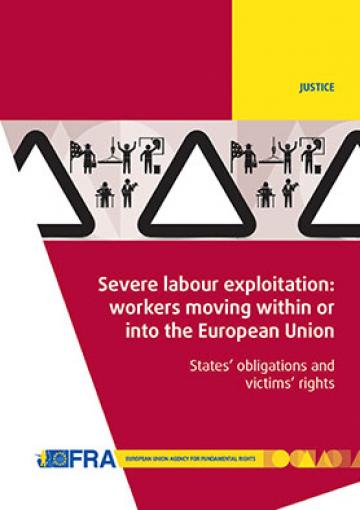Zero tolerance for severe forms of labour exploitation needed, FRA study says

been produced by people working under conditions of severe labour exploitation. A new
report by the EU Agency for Fundamental Rights (FRA) shows that while the EU has
legislation prohibiting certain forms of severe labour exploitation, workers moving within
or migrating to the EU are at risk of becoming victims.
Access report: Severe labour exploitation: workers moving within or into the European Union >>
Despite this, the offence of employing a migrant worker under particularly exploitative working conditions is punishable in some EU Member States with a maximum sentence of less than two years,a penalty that does not reflect the gravity of the fundamental rights violations involved.
"The exploitation of workers who have been forced by their economic and social circumstances to agree to substandard working conditions is unacceptable," said FRA interim Director Constantinos Manolopoulos. "We are talking here about an endemic problem that we must take urgent action to end. EU Member States need to make a greater effort to promote a climate of zero tolerance for severe forms of labour exploitation and take steps to monitor the situation more effectively and sanction perpetrators."
FRA’s new report is the first of its kind to comprehensively explore all criminal forms of labour exploitation in the EU affecting workers moving within or into the EU. The findings show that criminal labour exploitation is extensive in a number of industries, particularly agriculture, construction, hotel and catering, domestic work, and manufacturing, and also that perpetrators are at little risk of prosecution or of having to compensate victims. This situation does not only harm the victims themselves, but also undermines labour standards more broadly.
While exploited workers are spread across different geographical locations and sectors of the economy, they often have much in common, such as very low wages – sometimes of €1 per hour or less – and working days of 12 hours or more for six or even seven days a week. One important factor contributing to the present situation of widespread impunity is a lack of reporting by victims, who are either prevented from doing so or do not wish to come forward for fear of losing their job.
Among proposals FRA makes in the report to improve the situation are the following:
- EU Member States must ensure a comprehensive, effective and well-resourced system of workplace inspections.
- To improve the effectiveness of investigations into cases of severe labour exploitation, close links should be established between the police, public prosecutors and monitoring authorities such as labour inspectorates, support services, and employers’ associations, also in cross-border contexts.
- Victims’ access to justice needs to be strengthened, e.g. through greater efforts to make victims aware of their rights, both before and after their arrival in the EU country in which they are working.
- National authorities need to establish trust and provide a sense of safety, security and protection to encourage exploited workers to report their experiences, while labour inspectorates and police should cooperate more closely to ensure they identify cases of severe labour exploitation wherever they occur.
- Both private companies and national authorities are called on to ensure they avoid supporting labour exploitation by contracting or subcontracting companies involved in the exploitation of workers.
- Consumers must be informed of the risks that a product or service offered was created involving severe labour exploitation by such means as a system of certification and branding of products of companies that respect workers’ rights.
The full report is available in the press pack:
FRA publications on related issues can be found at the links below:
Victims of crime in the EU: the extent and nature of support for victims (report)
Fundamental rights at Europe’s southern sea borders (report)
Migrants in an irregular situation employed in domestic work: Fundamental rights challenges for the European Union and its Member States (report)
Criminalisation of migrants in an irregular situation (paper)
Legal entry channels to the EU (paper)
For further information please contact: media@fra.europa.eu
Tel.: +43 1 580 30 642
Notes to editors:
- Field research for this report was carried out in 21 EU countries, while research into the legal and institutional framework of severe labour exploitation was conducted in all 28 Member States.
- FRA conducted a total of 616 expert interviews with professional groups involved in the field of labour exploitation, including labour inspectorates, the police, judges, representatives of workers and employers, national policy experts, and recruitment agency staff.
- No victims were interviewed for this report. However, FRA will shortly be starting work on a follow-up project that will interview workers who have experienced or are at risk of labour exploitation in the EU.
- FRA is mandated to provide evidence-based advice to EU and national decision makers, thereby contributing to more informed and targeted fundamental rights policy.